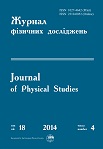DOI: https://doi.org/10.30970/jps.17.1703
THE INFLUENCE OF THE LiClO4 SALT ON THE PERCOLATION BEHAVIOR OF THE SYSTEMS BASED ON THE POLYPROPYLENE GLYCOL AND CARBON NANOTUBES
E. A. Lysenkov{1,2}, Yu. V. Yakovlev{2}, V. V. Klepko{2}
1V. O. Sukhomlynsky Mykolayiv National University,
24, Nikolska St., Mykolayiv, UA--54030, Ukraine
2The Institute of Macromolecular chemistry
of the NAS of Ukraine,
48, Kharkivske Chaussee, Kyiv, UA--02160, Ukraine
